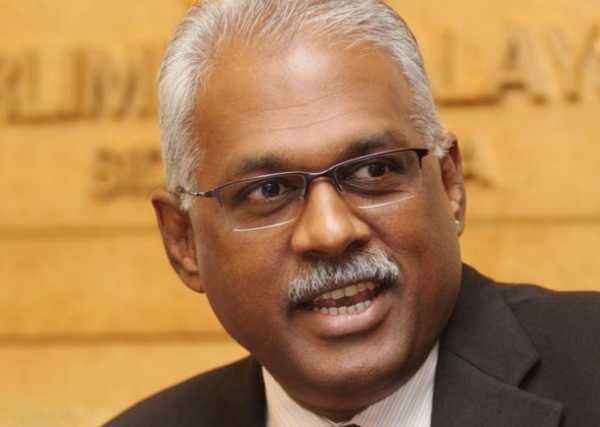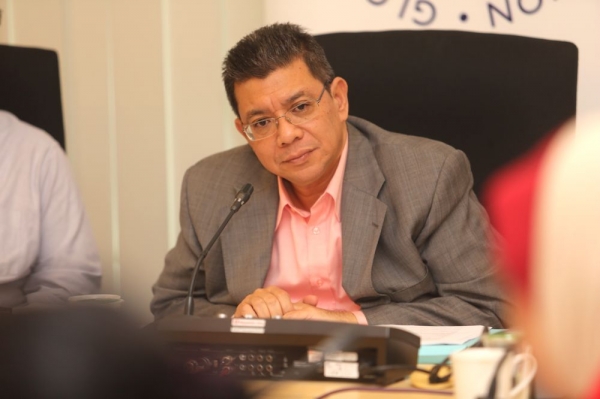Pakatan to keep funding sources secret until elections reformed

Charles Santiago claimed that there is a real risk of prosecution for opposition supporters if their identities are made known.
(The Malay Mail) – Federal opposition lawmakers here are intent on keeping their party funds secret until Putrajaya commits to a level playing field during elections, fearing prosecution of their funders if exposed.
They agreed that before buying in to any proposal to declare their funding sources, not only must their political foes in Barisan Nasional (BN) agree to do the same, a proper mechanism must be put in place to ensure fair play when it comes to spending during any electoral contest, from kick-off to finish.
One BN leader openly admitted that most, if not all, candidates tend to overspend when canvassing for votes in a heated election race with bills that run into exorbitant figures, even breaking the spending cap imposed by the Election Commission (EC).
But this, he said, is the very reason why all political parties should buy into the proposal to declare political financing as a starting point to even out the competition.
“Probably the only regulation we have now is the one administered by the EC… for instance for the state assembly you cannot spend more than RM50,000 and for parliamentary (contests) you cannot spend more than RM100,000 for each candidate,” Umno’s Datuk Saifuddin Abdullah told The Malay Mail Online when contacted.
“I do not believe that every candidate really spends below the ceiling, but I can tell you that all of us, when we submit the report, will claim that we spent below the ceiling.
“This is as truthful as I can be… if anyone marah (gets angry), I will ask them, are you sure you spent below the limit?” said the former deputy higher education minister and former Temerloh MP.
On Tuesday, officials with the National Key Result Areas (NKRA) against Corruption claimed that political parties have not been forthcoming when asked to declare the sources of their political funding, adding that politicians have not been clear about their reservations over the plan.
The agency said that the government is ready and willing to push the proposal forward, having already prepared final drafts to amend the Societies Act 1966 and related regulations to compel political parties to declare their financial sources.
Saifuddin admitted that any new law or regulation would typically have loopholes at the start, but stressed that it is only through purposeful regulation that any form of fair play can take root.
“I support the idea. It’s about time we come out with some kind of regulation. Why it is (sic) important? It’s about integrity. It’s all about integrity. Integrity of the politician as an individual, of the party as an organisation, and integrity of our political system.
“Of course, as I said, whatever regulation, there will always be loopholes. But we have to start somewhere… we cannot go on like this,” he said, in an apparent reference to the growing political polarisation in the country, especially after the recent 13th General Election last May when BN retained power despite losing out on the popular vote.
Pakatan Rakyat lawmakers, when questioned, appeared warm to the idea of declaring political financing but insisted this could not happen if election contests continue to stay in favour of the ruling BN, which holds the key to Putrajaya.
They said it would be a mistake to assume BN and PR are now on equal footing, arguing that there is a huge disparity in terms of the amount of funds available to either coalition.

Saifuddin admitted that any new law or regulation would typically have loopholes at the start, but stressed that it is only through purposeful regulation that any form of fair play can take root.
DAP’s Klang MP Charles Santiago agreed that every political party should, in principle, allow the public unfettered access to their financial accounts, but claimed that there is the real risk of prosecution for opposition supporters if their identities are made known.
He suggested that the government, through agencies such as the NKRA against Corruption, come up with clear guidelines such as those used in the United States – where political campaigns are in part publicly funded – to remove any ambiguity in the political process in Malaysia.
“First you must clarify the process, and it must be agreed to by all parties. Once the process is clear on how it’s going to be done, then you can ask for buy-ins from political parties,” he said when contacted.
“Political parties are not suicidal. They will consider this very carefully. If the identity of the donors are made public, they get prosecuted and we can kiss goodbye to their support in the next elections.
“In the US you have fair play, so you have big companies like (tobacco giant) Philip Morris giving funds to the Democrats and the Republicans. Only when there is a fair play environment, and there is no prosecution of funders, especially for the opposition, then we can do so. If we do it today, it’s suicidal,” Charles said.
PKR vice-president and Padang Serai MP N. Surendran said they are not opposed to the proposal, but claimed that it detracts from the bigger issue of BN’s alleged corrupt practices.
“There is a lack of understanding of the total picture, and it is ridiculous to equate funding for the opposition to the corrupt funds available to the federal government,” he said when contacted.
“I don’t think that is the main issue now in the country. The main issue is the corruption of the BN in funding themselves. They have the federal government and all sorts of sources, and they are also using government resources.
“The opposition is a poor political coalition, which is desperately getting donations from Malaysians who are committed to seeing democracy flourish in the country,” he said.
PAS supreme council member and Tumpat MP Datuk Kamarudin Jaafar, however, argued that even without a special mechanism to compel political parties to declare their political finances, the government can already act using existing laws under the Societies Act, which requires political parties to submit an annual financial report.
“I’ve not seen the latest (financial) documents filed by BN or Umno, but if they do (submit their financial report), I’m sure it would reflect very unrealistic spending, what more during an election year,” he said, referring to the BN coalition’s dominant party.
“We should get the RoS (Registrar of Societies) to look very carefully into the party’s annual accounts submitted very year… I doubt the culprits are the opposition in this case. I would think it is very likely the BN,” he claimed.
Political funding is an especially murky area in Malaysia, due to the close ties between political parties and businesses as well as an established system of political patronage that is said to fund huge war chests that come into play during elections.
BN component parties such as Umno and MCA own millions of ringgit in both shares and assets, and are among the wealthiest entities in the country.
The tight connection between parties and corporations continue to be a source of suspicion in Malaysia, where graft remains a perennial issue and politicians are viewed as the second-most corrupt people, behind only the police force.

